Tuesday, 31 January 2023
Care and Capitalist Reproduction
Monday, 30 January 2023
Can the Tories Manage a 1992-Style Comeback?
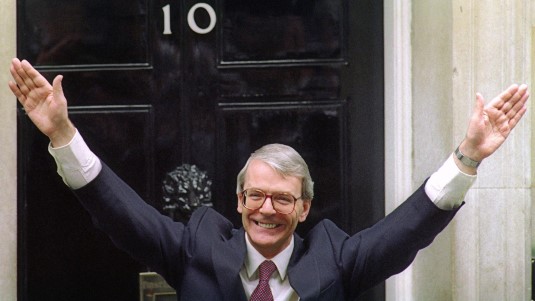
Let's think about the context. When Major took over in November 1990, the government was beset by crisis. The economy was in recession, and millions of mortgage holders were experiencing negative equity on their properties. I.e. They held mortgages worth more than the value of their houses. War in the Gulf looked imminent, and the Tories were trailing Labour in the polls by double digit deficits. Largely thanks to Margaret Thatcher's insistence on sticking with the Poll Tax, following the Trafalgar Square riot and the spread of protests and disorder they were utterly toxic. Sounds not entirely unlike now, with the NHS crisis, energy price inflation inducing economic slowdown, mortgage woes, and added, widespread industrial action by hundreds of thousands of workers.
Yet the Tories under Major were able to come back from this. First, when he took over Major was something of a fresh face. It has been remarked many times since that he rose without a trace in the Tory ranks. He entered Thatcher's cabinet in June 1987 and did a two year stint at the Treasury before his appointment to the foreign office. Within four months he was in Number 11 after the blessed Margaret disposed of Nigel Lawson's services and a year later the top job was his. It would be fair to say Major didn't become a household name in any of these roles. His (loyal) anonymity earned him preferment and, when Thatcher fell, he was in the right place at the right time. Major's easy mannered countenance, which some still find beguiling, contrasted favourably with Thatcher's hectoring, bruising style. As a character, Sunak is certainly more Major where Liz Truss and Boris Johnson were Margaret, but that's as far as it goes. Sunak is a known quantity and was for a time the most popular politician in the country, until the non dom tax dodging/green card affair sapped his standing. Similarly, since taking over Sunak has become associated with the politics of offering nothing, which is politically inept, among other things, at a moment of crisis. A fresh face he is not.
Which brings us to the second point. Major was blessed in that Thatcher was the dung pile toward which flies commuted. Despite having done many awful things in the 80s, the party was significantly less toxic than their most iconic post-war leader. The same cannot be said today now the party has delivered shambles upon disaster upon calamity, with each leader proving more chaotic and damaging than their predecessor. Thirdly, Major was a much more adept politician than Sunak. His first priority was taking the sting out of the Poll Tax, which he was able to do by promising a review under Michael Heseltine, with the nod, nod, wink, wink understanding that abolition was the only sensible outcome. In the mean time, Norman Lamont raised VAT to pay for a universal £140 discount on the tax, before its formal scrapping in March 1991. This did the trick and quickly helped restore Tory fortunes, along with the brief and successfully concluded Operation Desert Storm. Major was also able to paper over emerging divisions in the party on Europe by negotiating British opt outs from the Maastricht Treaty, above all its so-called social chapter that carried Bolshevist policies like guaranteed time off and minimum wages. Despite the recession and inflation running at 15%, his perceived competence - helped by an institutionally stronger Tory press - shielded Major from responsibility for the economic situation he inherited from former chancellor John Major. Sunak has shown none of this political sure-footedness. Major came up through the party and, like Thatcher, did the hard yards as an ordinary member and councillor. When Sunak's parachute landed on Richmond in 2015, his political experience was next to zero. And it shows with recent decisions, and a political strategy that regards doing very little as a virtue.
Lastly, despite surface appearances Sunak's Tories are in a far worse position than Major's were. Johnson was able to erode the party's reputation through persistent lying and chicanery, and Truss delivered the coup de grace by blowing the economy up and turbo charging inflation. All Sunak has managed is continuing with the stabilisation plan put in place by Jeremy Hunt, with some efforts at slick presentation on top. In fact, there is a 1992 John Major comparison that works with today's Tories. The period after Black Wednesday. Over the space of a day, the Tories destroyed their reputation for economic competence by spending billions to keep Britain in the Exchange Rate Mechanism, and all for nothing. It was followed in short order by their plans to close 31 pits with the loss of 31,000 jobs. It came across as vindictive, which Major recognised and regretfully reflected on in his memoirs. Though it was the timing that bothered him, not so the fate of mining communities left to rot. It cratered their electoral standing and there followed a slow, five year-long slide into division and oblivion.
This is where Sunak's Tories are at. A tarnished leader, a broken politics, a damaged party, crisis everywhere exacerbated by paralysed government, sleaze oozing out of every pore, and undergirding it all the Tories' long-term decline is threatening to put them out of office for a generation, if not longer. And no amount of finessing the numbers or inviting comparisons with more favourable moments from times gone by can disguise the hopeless situation they're in. And plenty of Tories know it, which can only mean more bad behaviour, ill-discipline, open corruption, and damaging, desperate attacks on our people in vain efforts to rally whatever's left of the faithful.
Image Credit
Sunday, 29 January 2023
Why Wasn't Zahawi Sacked Sooner?

Sunak got himself into an entirely unnecessary pickle. Surely someone, somewhere close to him had kept an eye on the developing Zahawi tax avoidance scandal, what with the solicitors' letters flying about and a few column inches of press coverage before the papers were splashing on his financial affairs. Where was the chief whip? Under questions from Keir Starmer at the last-but-one Prime Minister's Questions, Sunak said he was satisfied that Zahawi had given him a full explanation and there was nothing more to be said. When the news of the avoidance and penalty was made public, Sunak had a simple choice. Give him the sack or delay pending an inquiry, as per his statements at last week's PMQs. And Sunak preferred to delay, causing himself unnecessary political pain. Why did he make the masochistic choice?
As written here many times before, the authoritarian Prime Minister is central to neoliberal statecraft, and particularly so for the Conservative Party. Being seen to let go a naughty minister at the first sign of press trouble can be construed as being overly concerned with spin and therefore vulnerable to unfriendly headlines, a position no party leader would like to be in. But if they dig their heels in and resists the pressure, they're liable to take damage if revelations don't go away. Sunak has been here before with the always charming Suella Braverman. On that occasion he kept hold because her attacks on refugees are central to his political strategy. I.e. Offer nothing and hope unsubtle racism will carry enough of the voters who went Tory on Brexity grounds. If it worked back in October, why not now?
A key difference for Sunak, however, is that Braverman was not economical with the actualite to his face. Zahawi forgot to tell his boss that he paid HMRC a £3.7m penalty to clear up his tax affairs, and therefore made him look like a fool. But even then, when the case was clear on Wednesday Sunak didn't sack him but announced an inquiry by his ethics advisor. Again, why? It wasn't out of love for constitutional proprieties, but a sense of uncertainty about how the party might react. Zahawi isn't backbench boy band material, no one has ever thrown their knickers at him, but Sunak is aware of what his MPs and the wider membership think of tax issues. Just see the moaning during the week when Jeremy Hunt ruled out big tax cuts in the next budget. Where Sunak has misjudged is that he stuck too rigidly to his Braverman script, and was seemingly unaware that Zahawi was making him look like a mug and, indeed, the party knew that regardless of what they thought about tax, the affair was proving more damaging. Therefore, Sunak has shown once again that he just doesn't have the feel for the wider party that Johnson, and arguably, Liz Truss have.
The calls now for the disgraced Nadhim Zahawi to step down from Parliament are unlikely to be heeded. More interesting is who Sunak decides to replace him with. Hilariously, Johnson has been touted by Jacob Rees-Mogg, because why not? But also the walking tabloid headline writer, Lee Anderson, has been on the internal WhatsApp campaigning for the Tory chair job. Vying with Jonathan Gullis for the title of worst MP, it will undoubtedly go to another briefcase carrying crony. But with Sunak's judgement all over the shop, who knows?
Saturday, 28 January 2023
Boris Johnson and Corruption
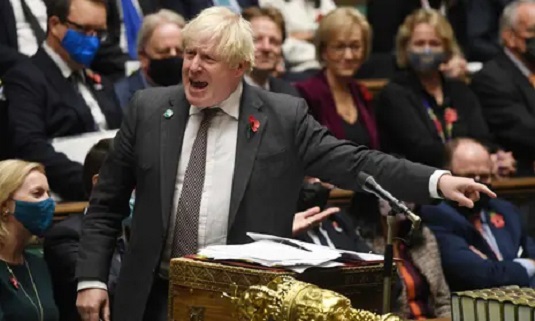
During the week Johnson and and Sharp denied there was any truth to the story, with both men going on the record - Sharp even appearing on "his" BBC - to deny it. Unfortunately for them, the text of a memo has been deposited in the hands of The Times. The note, from Cabinet Secretary Simon Case advised Johnson not to continue consulting with Sharp about his finances given his due appointment at the BBC. The ethics team also advised that it would be okay for Johnson to take out the loan, provided its guarantor, the Toronto-based businessman and Johnson cousin, Sam Blyth, had no UK interests. However, a month prior Blyth was mysteriously put forward as the lead candidate for the head of the British Council. If it looks, sounds, tastes, and feels like corruption, there can't really be any other conclusion.
Johnson lies as easily as he breathes. He's done so throughout his career, knowing the friendly press and other well-heeled allies could be relied on to pick him up following a stumble. And it was one lie too many that brought him down, when he denied knowing anything about sexual assault allegations against Christopher Pincher, his choice for deputy chief whip, when he appointed him. This from a (then) Prime Minister who'd previously referred to him as "Pincher by name, pincher by nature". The problem now for Johnson is that he's been caught in a lie yet again, this time with documentary proof. And that the Commons Privileges Committee are about to commence their inquiry into whether Johnson lied at the Dispatch Box about, more revelations about Johnson's basic dishonesty couldn't have come at a worst time. If that wasn't bad enough, Johnson was putting more effort into securing his £800k loan than mitigating the second, most fatal wave of Covid infections. This was December 2020 when he was busy accusing accusing Keir Starmer of trying to cancel Christmas rather than saving lives. Proof, as if it was needed, that the public health emergency was just a detail in the in tray left to roll over day after day, while what really mattered to Johnson was more money to finance his incontinent spending.
To get a little bit Freudian, Johnson can be thought of the incarnation of the Tory id. Sexual temptations, financial temptations, for a politician with a planet-sized ego he has precious little impulse control. A bit like the party of which, until recently, he was the personification. Given the choice between long-term planning and stability for British capitalism, often in the most crude and transparently sectional terms the Tories go for class war attacks each and every time. Johnson often got away with it. Liz Truss less so. Appropriate that his luck is running out just as the Tories' long-term decline is manifesting. Still, if he ends up getting turfed out of the Commons he'll console himself with the advance for his memoirs and those lucrative speaking tours. Time he should be spending paying for his criminal negligence and corruption instead of living it up.
Image Credit
Friday, 27 January 2023
Local Council By-Elections January 2023

Party
|
Number of Candidates
|
Total Vote
|
%
|
+/-
Dec |
+/- Jan 22
|
Avge/
Contest |
+/-
Seats |
Conservative
|
8
| 3,087 |
25.1%
| -6.1 |
-13.5
|
386
|
-4
|
Labour
|
9
| 5,334 |
43.3%
| +14.8 |
+12.3
| 593
|
+6
|
Lib Dem
|
5
| 772
|
6.3%
| -4.7 |
-3.2
|
154
|
0
|
Green
|
4
| 860
|
7.0%
| +0.0
|
+0.0
|
215
|
+1
|
SNP*
|
0
| |
0
| ||||
PC**
|
0
| | |
0
| |||
Ind***
|
6
| 1,620 |
13.2%
|
+8.9
|
270
|
-1
| |
Other****
|
4
|
4.7%
| +4.2 |
+4.7
|
146
|
-2
|
* There were no byelections in Scotland
** There were no by-elections in Wales
*** The were no Independent clashes
**** Others this month consisted of Residents for Uttleford (238), TUSC (15, 18), Yorkshire Party (314)
January is as closest to silly season local council by-elections get. The politics doesn't stop but local authorities wind down, election campaigners prefer to be inside than outside, and so tradition is comparatively few contests happen in this month. Because of this results can be skewed and the relation between actual votes and opinion poll reporting appear wide of the mark. The first tally of 2023 breaks this tradition. There were only a few contests (eight), but the gap between the two main parties and the shares recorded for the smaller parties reflecting national polling. Undeniably, January was another terrible month for the Tories, having lost five seats and picking one up in consolation. Labour on the other hand pretty much conquered all it surveyed, continuing its run of excellent results by picking up seats here, there, and everywhere.
It might be a fluke of the month, but this is the first month ever that the Greens have managed to outpoll the Liberal Democrats. Even in the dog days of the coalition years this did not happen. Obviously too early to say whether they're at the beginning of replacing the Lib Dems as England's third party. Only future by-election can start answering that question.
Looking forward to February, there are 14 contests to look forward to, half of which are Tory held. Might another wipe out be on the cards?
5 January:
Cannock Chase, Etching Hill & The Heath, Lab gain from Con
Uttlesford, Great Dunmow South & Barnston, Con gain from Oth (Residents for Uttlesford)
12 January:
Plymouth, Moor View, Lab gain from Con
Plymouth, Plympton Chaddlewood, Grn gain from Con
19 January:
Staffordshire, Biddulph North, Lab gain from Con
Staffordshire Moorlands, Biddulph West, Lab gain from Con, Lab gain from Ind
Stevenage, Bedwell, Lab hold
26 January:
Rotherham, Keppel, Lab gain from Oth (Rotherham Democratic Party)
Thursday, 26 January 2023
Did Remain Cause a Hard Brexit?
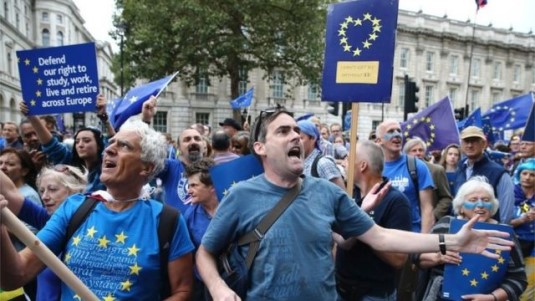
First, where I agree. As a movement of parliamentarians and in the wider country, Remain did not cause the Brexit shit show we ended up with. He's right. Theresa May was responsible when she set out the terms of what Brexit meant in the most narrow, sovereigntist terms possible and as argued at the time and since her concern was about keeping the Tory party together. This trumped everything else. Second, May and Boris Johnson, who converted to Brexit because it was but a trifle, chicken feed you might say, for the country to pay if it meant having him for Prime Minister. And third, the campaign for a second referendum was wrong. For Tyrone, it's because if it was successful and remain won there would be endless bad blood, and if leave was reaffirmed politics would be in an even darker, more reactionary place than now. Though, as was obvious at the time, for many of the elite figures involved, particularly from Labour, getting another referendum was a secondary objective.
Disagreements. On the indicative votes, and the brief window of negotiations that took place between May and Jeremy Corbyn after her Brexit deal was smashed by massive government defeats. Taking the votes first, readers might remember that four options were put before the Commons. There was the revocation of Article 50 in the event of a no deal Brexit, pushed by the SNP. Peter Kyle put down a second referendum option, Ken Clarke a Brexit that would have kept Britain inside the Customs Union, and the softest of Brexits pushed by Nick Boles that kept the meat of Clarke's preference and added the gravy of free movement and some form of single market access. Labour whipped for all save the SNP's motion, and for their part the SNP supported Boles's Brexit. Boles fell 261-282, Kyle 280-292, and Clarke 273-276. Tyrone argues if a few more remain-minded MPs had given an inch and supported Clarke, it wouldn't have mattered because an indicative vote is, unsurprisingly, indicative. Not much would have materially changed.
Politics is a matter of probabilities, and there's a deal of reading back the actual outcome into what might have happened. Remember, the indicative process begun because the Commons was log-jammed. At this stage Article 50 was still ticking away after its first extension and following May's third defeat. No deal was not off the table, and it appeared paralysis could lead to the worst possible outcome. Given the fevered state of politics, the consequence of a positive vote in favour of the Clarke option would have transformed the situation. As we later saw in the Autumn, and given John Bercow's thinly concealed support for the opposition, there is good reason to believe parliament could have wrestled away control of the legislative timetable from May's imploding government. A proper motion for Clarke could have gone down and might well have been won and all bets would have been off for what happened next. But whatever possibilities that moment may have had were shut off because the Liberal Democrats, Change UK and the SNP did not support it. Given Scotland voted remain, there were very good reasons for the SNP to do as they did. Not so the ultra remain parties. That doesn't make them chiefly responsible for what did happen, but their choices had consequences.
On the negotiations, Tyrone argues Corbyn has more responsibility for the hard Brexit because he could simply have whipped for May's deal, which was a de facto customs arrangement anyway. He's right that the Tories would have self-destructed if May had to rely on Corbyn's support, but this supposes Labour were happy campers at this stage. When May invited all comers into negotiations with the government, so desperate was she to get her deal done that she offered absolutely no concessions to anybody. Labour wanted to make changes to her political declaration and, as a floor, affirm remaining in the customs union - as per Clarke's position. May wasn't interested. In this situation, Corbyn could have said fine, the party will support her deal despite not offering anything and caused a serious split in its own ranks. Not just with remain-ultra MPs on its backbenches, but very probably on its front bench and among the membership itself. Remember, Labour was forced to adopt the second referendum position eventually because supporting Leave on Tory terms, whether May's or Johnson's, would have destroyed the party. Think the 2019 result was bad? It could have been so much worse.
When it comes down to it, Brexit is a complete dog's dinner. It's a criminal waste of time when other social problems are going begging and most of the major nations are sitting on their hands as climate change disaster bears down on us. But it could have been handled differently, and the kind of exit we got was not inevitable. Remain as a movement are not responsible, though actions by some of its adherents limited the scope for a different ending. Nor for that matter was Jeremy Corbyn who worked to protect the position of our people. It's so much easier to think about the Brexit wars as personality clashes and blame games, but as with all things political it was a struggle between interests. And that's how the politics and fall out of the referendum must be approached.
Image Credit
Wednesday, 25 January 2023
Coarseness

As we saw last time Guliis made the news, his racism is central to his re-election bid. With his fellow Tories on Stoke-on-Trent City Council wedded to a regeneration strategy based on multi-storey car parks and his Tunstall patch having gone decidedly down bank, as we say around these parts, crude BNP-style race baiting is all he has in the tank. Like most of the political establishment who think the so-called Red Wall is uniquely racist, he's certain a few campaigns against asylum seekers and a bit of "truth telling" is all it takes to get elected. And if he needs proof of cut through, the frightful horrors infesting his Facebook page are encouraging enough.
Gullis acts like he's in a race to the gutter with the not overly blessed Lee Anderson and Andrew Bridgen, perhaps with a view to right wing grifting on GB News when all other employment opportunities are shut to him. But he is a creature of the discourse, and how there is a certain coarseness to it. By the time of the New Labour years, it was clearly established that how you said things mattered more than what was actually said. When you think about the horrendous things done under his Tonyness, such as extraordinary rendition, the demonisation of Muslims and asylum seekers, attacks on "problem parents" and the disabled, and the lies propagated in the lead up to the invasion of Iraq, all were spun according to established and accepted euphemisms, civilities, and newspeak. Blair was a master at sounding sincere and polite while his activities were anything but, and he had to add his own innovation too.
But political fashions come and go in language just as much as ideas. When the Tories assumed power in 2010 they imbued polite discourse with so much cynicism and double think that the pretence could not hold, especially with the likes of Nigel Farage sniping from the Tories' right flank with bullets that, apparently, told it as it was. Add to this the polarisation of politics starting from the 2014 independence referendum, the Labour establishment getting their nose put out of joint in 2015, then all of the official establishment suffering catastrophic defeat in 2016, the near death election of 2017, and then the Brexit wars, Covid, and Boris Johnson's endless lying, we're now in a situation where saying the unsayable is very sayable actually. The rules of discourse have broken down, along with the rules of evidence and with it the collapse in what is true and what is false. Even "Mr Rules", Keir Starmer himself, while still affecting the proper manners is as post-truth as the rest.
Gullis is but a man of his time. No one forces him to be a no-quality nasty bastard, but dirt like him wouldn't be thriving were it not for the collective behaviour of the dominant factions of the Westminster parties. It's not enough to see Gullis sacked from the Tories and voted out of office because someone else will carry on where he left off. It requires something much stronger: a deep and thoroughgoing structural transformation of politics, and that is inseparable from the project of wider social struggle.
Monday, 23 January 2023
Tax Needn't Be Taxing
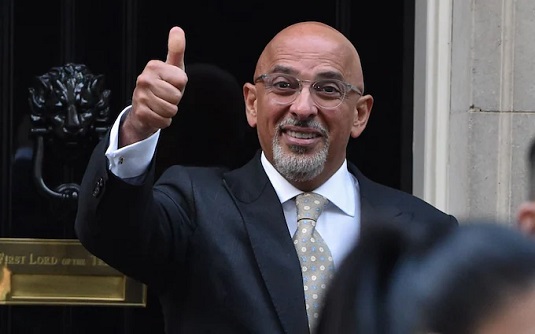
Eagle-eyed Westminster watchers noted how James Cleverly refused to offer a defence of Zahawi when invited to on Laura Kuenssberg on Sunday. And though Zahawi is playing variations of keep mum/nothing to see here/everything above board/an honest mistake and therefore is refusing to resign, Rishi Sunak has adopted a favourite tactic of Johnson's and kicked the can down the road. He's asked the cabinet's "independent" ethics advisor to look into the affair, just so it can be brushed off when the report is filed months down the line. So much for Sunak's promises of political integrity when he assumed office.
As we saw with the Suella Braverman case, Sunak is absolutely loath to let anyone go. For Sunak's Tories are the same party as his predecessors - their authority is bound up with the projection of a strong prime ministerial figure. If that goes, they go. Ask Liz Truss, Boris Johnson, and Theresa May. Beset by chaos on all sides and an eroding electoral base, Sunak's not about to make his predicament worse by appearing weak and getting shot of a minister whenever the press says boo to a goose. And as for Zahawi who, despite placing miserably in the summer's leadership contest, he still has political ambitions and would like to keep his seat in the bunker right up until the moment the Tory fronts collapse. Because when opposition comes, especially in the early years of a Starmer government, opportunities for notability will be few and far between. Unless there are new revelations about his tax dodging or strong arming HMRC or threatening to sic lawyers on nosey tax specialists, or if Sunak tells him to resign with dignity, he won't.
While this is another example of double standards and a sign of corrupt practices, as far as many Tories are concerned if anything Zahawi should be awarded a gong for going without paying. When an "entrepreneur" launches a business, they have a divine right to the money it makes. Never mind that surplus value and profit are ultimately unpaid wages, from their point of view it's the reward of hard effort, genius, and nous. For the state to come along and claim a wodge in taxes to fund some public service run by Marxists is appalling. That business is impossible without the public infrastructure maintained by the state is one for the memory hole. Therefore, to side step tax through elaborate avoidance schemes is actually virtuous. Zahawi and those like him are exercising their sovereign powers to say no and deserve admiration, not opprobrium. Some Tories might genuinely possess the taxpayer's outook and be genuinely angry about Zahawi seeing as they've dutifully paid their taxes and contributions, but the cognoscenti know this is nonsense reserved for the punters. Fill your boots while you can is the Tory way, and those not averse to diverting state money to causes and interests close to them aren't bothered, let alone ashamed. Least of all Sunak, who had a few taxing difficulties of his own.
It's obvious Zahawi's position is untenable, and it might be that the public pressure will prove too much. Johnson might be gone, but his epigoni are set on demonstrating how transparently crooked the party still is. With nothing left to lose and electoral defeat certain, why not openly affect your contempt for the rules and abuse your power for personal gain?
Image Credit
Saturday, 21 January 2023
The Tory Politics of NHS Charges
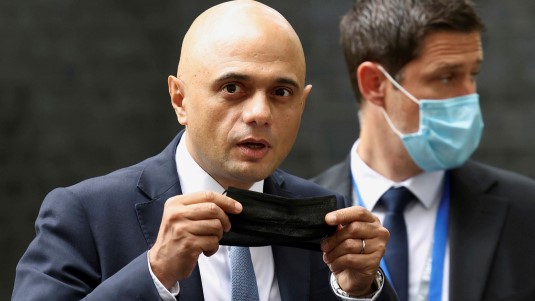
For a lot of Tories, the NHS has always represented a socialist Trojan horse in the British body politic. Free at the point of use on the basis of need? How grotesque. If health care is decommodified, what else might be next? But even more outrageous is the fact the idea of the NHS has remained stubbornly popular. It's no accident that The Tories, from its inception, have sought to hobble it. This has especially been the case since 1979 when the Tories declared open warfare on everything and anything that smacked of "socialism". Their governments have worn it down by denying funding, introducing internal markets, holding down staff pay, and conceding conditionalities around the NHS's margins. The aim, consistent with how the Tories have remodelled social security and public housing, is not the introduction of charges but its residualisation. It suits capital more to have one consumer of medicine underwritten by bottomless pockets of state money than the uncertainty of competition. Though driving more affluent people into private medical insurance is a bonus.
For the likes of Javid, there are other concerns. For most Tories having the state do anything is anathema. Indeed, Rishi Sunak has almost transformed it into performance art. Run institutions down, pretend everything is out of your hands, no one will look to the government to do anything and the Tories can pretty much do what they like. It's a strategy whose desired outcome is a depoliticisation of politics. As long as the NHS exists, however, there is an expectation on the state that it be funded properly. And when it doesn't work, like now, it becomes an axis of accountability the Tories would rather do without.
Despite his weird foray into anti-austerity politics, we know Javid is an avowed disciple of Ayn Rand and her "objectivist" horse shit. Which, like all right wing libertarianism is capital's collective whinge about having any responsibility for the people they exploit. Getting shot of the NHS is attractive because as soon as charges are introduced, the case for reducing National Insurance makes itself. And as NI payments fall on employers as well as employees, in the Javid/Randian imagination another burden on capital accumulation can be whittled away.
A day's worth of media about an exit-bound senior Tory wanting to do the NHS won't win the government points with anybody, including the eroding base. But there's still over a year of Conservative administration to run, and plenty of more opportunities for them to damage the institutions we depend on and, ultimately, us.
Image Credit
Friday, 20 January 2023
Still Room for Hope
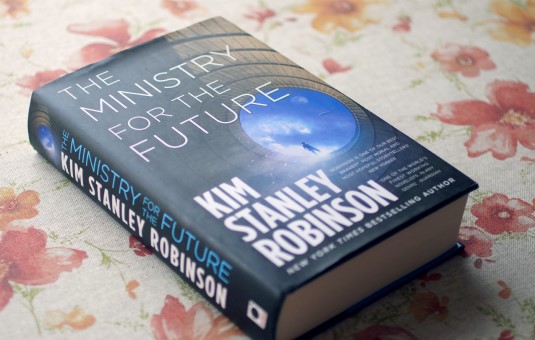
That said, while Ministry is a novel, it would be more accurate to describe it as a manifesto. The plot, such as it is, is thin. Beginning with an extreme heat event that kills 20 million Indians a few years hence, a chain of events unfurl in which the world undergoes a combination of ecological modernisation, geo-engineering to prevent ice cap melt, and social revolution. Mary Murphy as head of the Ministry for the Future, a UN agency established by the Paris Climate Accords to look after the interests of the not-yet-born, is the main viewpoint through which the story proceeds. And variously the action moves from meetings with central bankers and other assorted important people to those either on the sharp end of climate disasters or at the forefront of mitigation efforts. Peppered along the way are quick, accessible dives into science, economics, and social theory.
On top of its timeliness, Ministry interests for two reasons. There is its theory of social change. As a work of sociological imagining, Robinson describes the decades-long transition from neoliberal, extractive capitalism to something else. Mostly, governments and financial institutions are tools for stripping back capital's supremacy, and are forced by popular pressure and by what Hardt and Negri refer to as 'exodus'. I.e. People cooperating and forming their own circuits of social reproduction independently of capital. This is illustrated by the repatriation of data to individual users, requiring social media platforms to hand over fees if they want access to it as per current business models, cooperatisation of swathes of industry, and the emergence of tough regulatory regimes for international finance that ties capital down and to social obligations. At the heart of this project is the introduction of the Carbon coin, which is issued in its trillions to states and multinationals for keeping their fossil fuel reserves in the ground, and is awarded to anyone and everyone who draws carbon from the atmosphere, either by traditional means (tree planting) or employing capture technologies. Also of interest is the use Robinson imagines for block chain. It effectively provides a ledger for the carbon coin, so its transactional history can be tracked. What might have Orwellian implications in the context of an authoritarian state forms a system of open surveillance, which over times works to exclude all other forms of money that remains dark. Hence speculation and tax havens become a thing of the past, and eventually limits on maximum wealth are introduced. But none of this happens because of a light bulb moment. Violence via ecoterrorism plays its part by targeting polluters, such as executive members of fossil fuel firms, and Robinson writes of attacks against air liners and container ships using legacy fuels, and sabotage on coal-fired power stations. Each encourage the take up of greener alternatives, which in turn spurs innovation that renders fossil fuelled combustion engines obsolete and expensive. Throughout the transition, Robinson never indulges a year zero moment. There are protests and revolutions, but there is no clean sweep of the Leninist imaginary. Everything is messy, everything is a struggle.
In his critique, Francis Fukuyama - he of the end of history fame - argued that Robinson's projection is unrealistic. It's too optimistic because, when all is said and done, the right political decisions are always made. Yes, but this misconstrues the point of the book. As a fictionalised manifesto, Robinson is pointing us toward a future which will be difficult but is by no means bleak. It requires we draw on our collective talents and make a concerted effort as a species to undo the climate, environmental, and species extinction impacts of the last 300-400 years. In other words, by positing the best possible outcome of our mitigation efforts, what Robinson is demonstrating is how it is possible, that we can make a better future. It is well within our powers to achieve it. Mindful of Fredric Jameson's famous "it's easier to imagine the end of the world than the end of capitalism", Ministry - like much else of Robinson's science fiction, from his Mars Trilogy to his previous novel, Red Moon, the problem the end of capitalism is dealt with and more open, alternative futures are imagined. Here, by explicitly tying action on climate change to action on capitalist relations of production, Robinson is making the point that a sustainable society is not possible on the foundation of extractive, exploitative economics.
There is a lot to The Ministry of the Future, and it adds another weapon to our armoury. Dystopian fiction is exhausted, nihilistic, and ultimately conservative. This is its opposite. In the face of looming catastrophe, Robinson reminds us that there is still room for hope.
Image Credit
Wednesday, 18 January 2023
Divisions Among the Tory Base
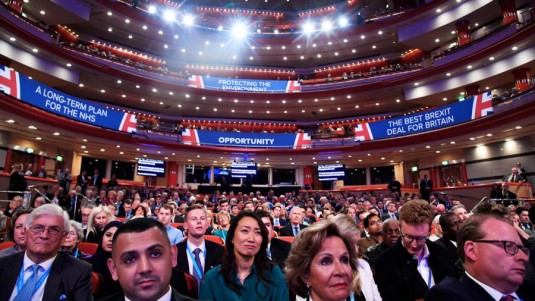
If we consider mortgage holders natural Tory supporters, that hasn't been true since at least the 2017 election. Considering the details from the last YouGov poll, we see the Tories trail badly among every age group who are working age. Even among the 50-64s, there's a 15-point deficit. Among the 25s-49s it's a 45-point difference. This is where most of the country's 7.4m mortgage holders are, and if Chan thinks this group can be won back by Jeremy Hunt instructing the Bank of England to cut interest rates before the next election, he's going to be disappointed.
The reasons why are obvious. As the article acknowledges, Liz Truss's blowing up of the economy terrified mortgage holders up and down the land. That, combined with stoking inflation has irreparably crashed the Tories' reputation for economic management, and no amount of briefcase burnishing or divide-and-rule can turn the situation around. People have memories. Additionally, for a good chunk of mortgage holders the Tory record in government have made life needlessly difficult, especially where a mortgage holder happens to be employed in the public sector. Millions of these people are never going to vote Tory, and it will be an antipathy they carry with them when they become owner occupiers and later retire. Assuming there will be such a thing as a retirement age when younger cohorts get there.
Having to choose between these and older voters shouldn't be too difficult for the Tories, because they've already lost this prop of mass conservatism. But what of the layers of owner occupiers? The advantage for the Tories resolves itself clearly among older people where concerns other than a percentage point on savings might be expected to predominate. Most notably, the NHS. It's in crisis don't you know, not that Rishi Sunak would ever admit it. And yet what do we see in the polls? Among the over 65s the Tories don't just retain a lead, but a 19-point lead. Admittedly, this is a sub-sample of a sample (397 out of 1,691) but is consistent with poll findings time after time. With the elderly uniquely exposed, why are they clinging on when everyone else has given the Tories the heave ho?
19 points might seem a lot, but it's nothing compared to what the Tories enjoyed one, two, three years ago. Some of the fall, at least according to YouGov, is thanks to the phantom threat of Reform UK. Others, it seems, either by direct experience of Tory chaos in public services or listening to their children, have fallen away. Enough, when combined with working age people, to administer an electoral massacre in the near future. Explaining why most of the elderly are proving to be outliers is partly thanks to an argument advanced by Chan. That, dependent on pension income, they are relatively shielded from the vicissitudes of the economy. Tory energy price inaction and dynamiting the British economy have seen prices rise, but - aided by the disproportionate influence of the right wing press - these are viewed fatalistically, as either matters out of the government's control, or because of the war in Ukraine. Truss might have been mistaken, but she was trying to do the right thing.
This shielding certainly helps, but what's missing is the appreciation of how 'pensioner' works as a structural location. As argued here previously as well as in the book, being retired and living off a fixed income, plus (where applicable) modest savings, shares and, in some cases, rents renders them analogous to the petit bourgeois in class terms. It individuates, privatises, and inculcates a certain anxiety. If something goes wrong, they can't seek extra hours, go out and work again, or easily get loans to cover emergency expenses. Being shielded against economic head winds does nothing to mollify an inchoate angst, and therefore just as the petit bourgeois have historically been the backbone of reactionary and populist movements, so the armies of the retired are the voting fodder for the Tories. Especially when led by someone like Boris Johnson, whose authoritarianism and nationalist/war-on-woke rhetoric offered an illusion of stability, a political salve to the itch of structural anxiety.
Yet the Tories and the NHS, why have the elderly refused to punish them politically for the public service they're most dependent on? It's because of decades of depoliticising the NHS as an issue. That it's always been in crisis since the Tories took over is true, but the pandemic and health service strikes has repoliticised it as far as the public imagination are concerned. But still, years of blaming hypochondriacs, health tourists, immigrants, self-inflicted illness, as well as immense amounts of waste arising from mismanagement have taken the sting out of how the Tories have handled the service. Their entirely conscious decision to not match funding to demand makes it appear as if the NHS is swamped and that there are too many demands on it. So right now, with A&E's bursting with Covid and flu, ambulances languishing around hospital entrances, it's just an unfortunate series of events. Okay, so my hip op or appointment with the specialist is delayed, but at best it's bad luck and at worst those grasping nurses are to blame. Unless the Tory press round on Sunak for what his mob are doing, it's unlikely his party's core support are going to see things any different.
What this means when it comes to the Tory base is one has pretty much gone, and the other has shrunk a bit but what remains shows no sign of abandoning a party that is helping many of them into an early grave. The Tories can't bring them back together, that ship has sailed. Instead we see our Prime Minister following through with a core vote strategy, presumably hoping enough of the blasted ship will weather the coming storm so it can set sail to new horizons of electoral victories in relatively short order. Given the long-term decline of the Tory base, it doesn't seem like a realistic hope. But in the mean time, having decided to carry on as they are, a lot more pain, damage, and unnecessary suffering is in our future, including where not a few elderly Tory voters are concerned.